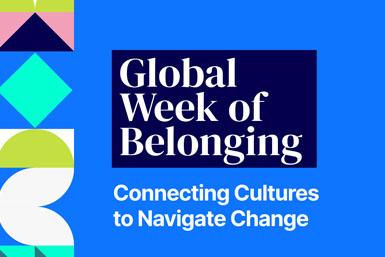We’re celebrating our fourth annual Global Week of Belonging, a time to further educate, engage and involve colleagues in our Diversity, Equity, Inclusion, and Belonging (DEIB) efforts. This year’s theme, “Connecting Cultures to Navigate Change,” highlights the importance of understanding and embracing diverse perspectives to foster an inclusive environment, where everyone feels that they belong. For this special edition of Inside Edelman, we profiled colleagues from our global offices who are embodying Edelman’s commitment to DEIB and are advocates for building acceptance and understanding within the firm and beyond.
What does belonging mean to you within the context of cultural diversity, and why do you think it’s important in the workplace?
To me, belonging in the workplace encompasses more than just mere inclusion; it involves the active acknowledgement, respect, celebration, and representation of cultural diversity at every level –from account teams and senior leadership to the clients and work we champion.
As a member of the Asian American, Native Hawaiian, and Pacific Islander (AANHPI) community, I celebrate the many languages, traditions, religious beliefs, and narratives that inform our identities. Witnessing new generations of the AANHPI community enter the workforce while continuing to face the “model minority” stereotype or surface-level classification of our community as a monolith further motivates me to advocate for a culturally aware workplace.
The nuanced perspectives that employees bring to work are informed by our unique lived experiences, including my own as a first-generation daughter of immigrants. These valuable perspectives enrich creative environments – particularly within a global communications firm like Edelman. Cultural diversity can encourage companies to reject ignorance and broaden their worldview. In the modern workplace, cultural diversity shouldn’t just be a checklist item on the corporate agenda, but rather a source of strength that fosters inclusivity and belonging.
How do you think the intersection of different cultures influences one's sense of belonging?
As a Muslim American, Asian American, and Pakistani American, I recognize the many layers of my identity and how they shape my sense of belonging. These identifiers reflect the rich diversity of cultures that influence every aspect of my life, from the languages I speak to the foods I grew up enjoying, and even to how I express my heritage and faith in personal and professional contexts.
Being a first-generation daughter of Muslim immigrants, and growing up in post-9/11 New York, I also recognize the importance of the diverse, and sometimes harsh, lived experiences that have shaped me. It is through these lived experiences that I’ve come to cherish intersectionality and values such as hard work, curiosity, and respect for others. These serve as guiding principles in my life, encouraging me to learn from others while actively seeking out, celebrating, and uplifting spaces that honor diversity.
From your perspective, what are the most significant barriers to achieving a sense of connectivity and belonging in the workplace and how can we address them?
Addressing barriers to connectivity and belonging requires a multi-faceted approach centered around education, engagement, and empowerment. Colleagues across the network must recognize not only the value of diversity, equity, inclusion and belonging, but how Edelman actively champions these principles through tangible actions.
Cultural diversity within the workplace should be celebrated via consistent engagement. Employees should feel included and valued throughout the year, with initiatives that reflect and honor their diverse backgrounds beyond one-off events or heritage month celebrations. Additionally, providing consistent physical spaces of belonging is vital. This can include creating prayer areas for religiously observant colleagues, or dedicated spaces for employee networks or affinity groups to convene and collaborate.
It’s important to recognize that a company’s strength lies not only in its business services and offerings, but the collective well-being of its workforce. Addressing barriers to connectivity and belonging enhances employee morale and ultimately benefits the long-term health of an organization. By implementing intentional measures, more colleagues can feel respected, supported, and empowered to contribute to a culture of care.
How do you personally try to foster a sense of belonging within your team or your organization?
As a Boundless U.S. lead, one of Edelman’s Employee Network Groups (ENGs), fostering a sense of belonging within my team and our organization is a priority for me. I actively engage with colleagues in New York and nationwide to foster communication and organize meaningful employee engagements. For instance, I participated in an AANHPI employee panel and led a South-Asian inspired cooking demonstration with New York leadership last year. This year, I’ve worked with our Boundless NY team to coordinate a local volunteering opportunity for colleagues.
Additionally, as a practicing Muslim, I have contributed to the development of our local and national Ramadan messaging, including providing insights for an Uplift (Edelman’s interfaith ENG) newsletter on Islam. By dedicating time and efforts outside of my client responsibilities, I aim to ensure that I do my part in highlighting and celebrating cultural diversity within our organization.
Beyond these specific initiatives, I am committed to creating an inclusive work environment by actively welcoming new colleagues, sharing best practices, asking questions, and promoting open communication. I’m grateful to those who warmly welcomed me when I first joined Edelman, and I hope colleagues continue to cultivate an open, collaborative, and respectful community.
Fatimah Alyas is an Account Supervisor on the Edelman Social Impact and Sustainability team based in New York.




